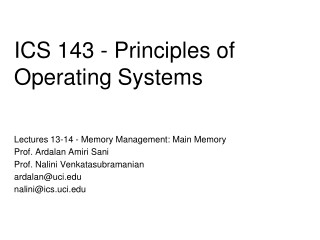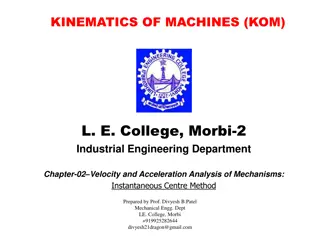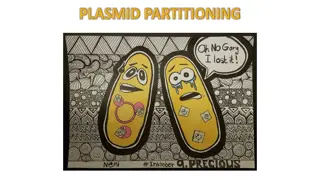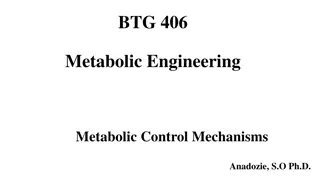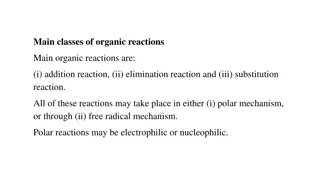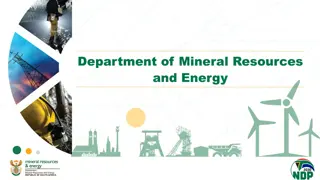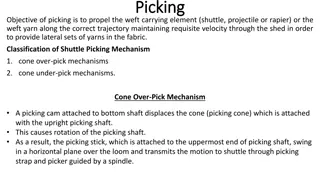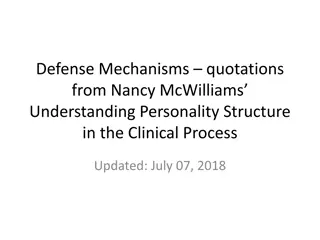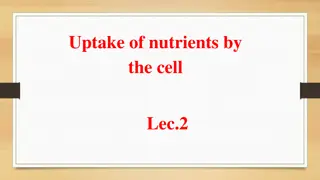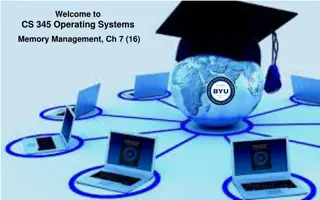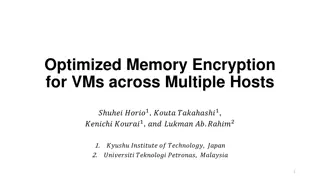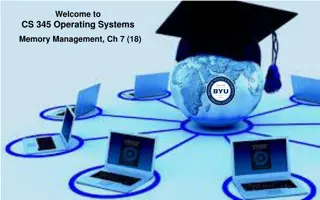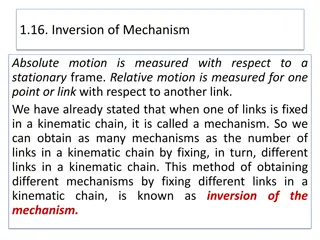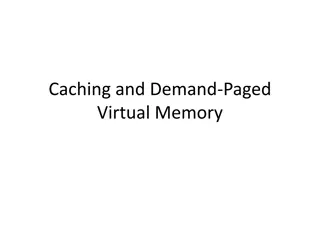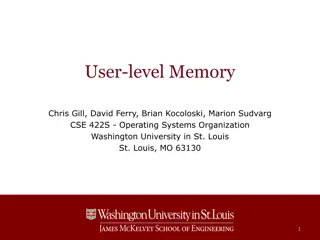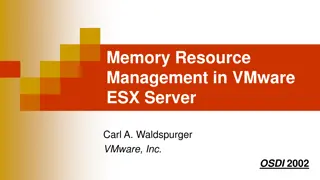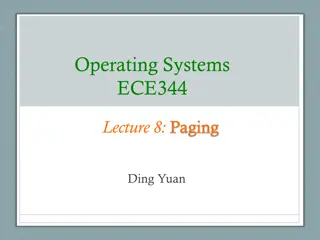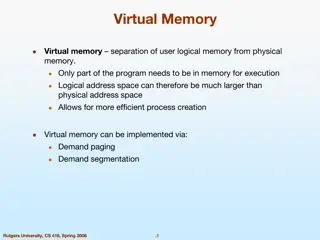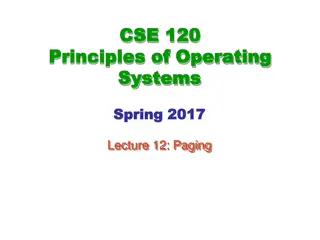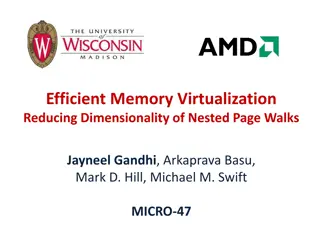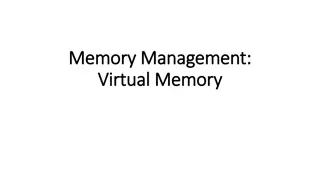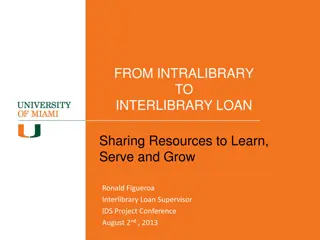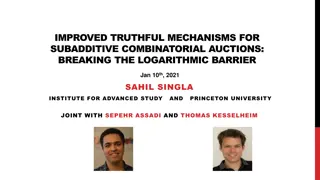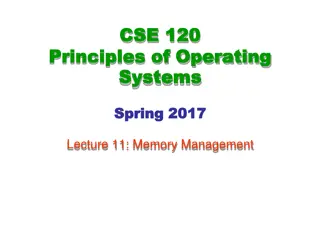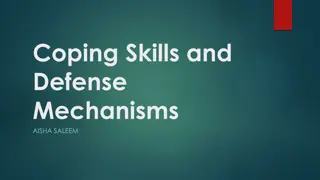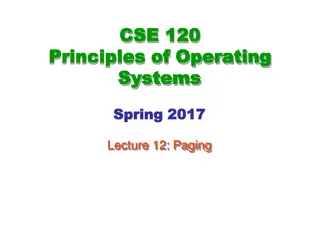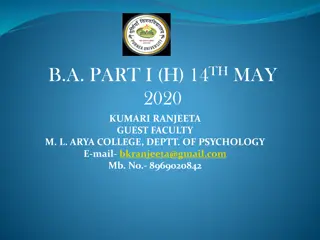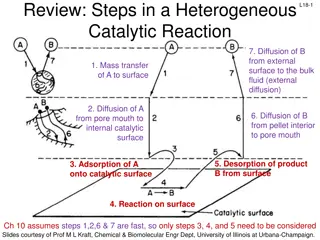ICS 143 - Principles of Operating Systems
The principles and techniques of memory management in operating systems, including swapping, contiguous allocation, paging, and segmentation. Understand the importance of virtualizing resources and controlling overlap, protection, and translation of memory.
1 views • 52 slides
Understanding Narcotic Analgesics and Opiates: History, Mechanisms, and Uses
Delve into the world of narcotic analgesics and opiates, exploring the history of opium poppy, morphine derivatives, opioid compounds, and the pharmacology mechanisms of action. Discover the uses of opiates in analgesia, preanesthetic medication, and more, alongside the endogenous ligands involved.
8 views • 55 slides
Advancements in Chemical Mechanisms for Air Quality Management
Daniel Jacob and team have been enhancing chemical mechanisms in the GEOS-Chem model to support US air quality management. Ongoing work includes developing new mechanisms for aromatic VOCs, tropospheric halogens, mercury redox, adaptive mechanism reduction, machine learning applications, and unifica
0 views • 19 slides
Kinematics of Machines: Instantaneous Center Method for Velocity and Acceleration Analysis
Explore the method of locating instantaneous centers in mechanisms to analyze velocity and acceleration. The content covers examples of pin-jointed four-bar mechanisms and slider-crank mechanisms, providing dimensions and angular velocities calculations. Prof. Divyesh B. Patel from L.E. College, Mor
0 views • 13 slides
Understanding Plasmid Partitioning Mechanisms in Bacteria
The stable maintenance of low-copy-number plasmids in bacteria relies on partition mechanisms that ensure proper positioning during cell division. Different from high-copy-number plasmids, which rely on random diffusion, low-copy-number plasmids require regulated partitioning mechanisms to prevent d
0 views • 14 slides
Understanding Metabolic Control Mechanisms in Cellular Regulation
Metabolic control mechanisms play a crucial role in maintaining homeostasis within cells by regulating metabolic pathways. This involves finely adjusting the output of pathways in response to external signals, ensuring the proper flux of metabolites to meet cellular needs. Pacemaker enzymes, such as
1 views • 17 slides
Overview of Organic Reactions and Mechanisms
Organic reactions can be categorized into addition, elimination, and substitution reactions, occurring through either polar or free radical mechanisms. Polar reactions may be electrophilic or nucleophilic, while free radical reactions involve radicals reacting to complete electron octets. Different
2 views • 26 slides
Understanding Prezygotic Reproductive Isolating Mechanisms
Prezygotic reproductive isolating mechanisms prevent mating or fertilization between different species before it can occur. Examples include habitat isolation, behavioral isolation, and temporal isolation. These mechanisms play a significant role in maintaining species integrity and preventing the f
0 views • 4 slides
Fuel Pricing Mechanisms and Regulatory Framework Presentation
This presentation to the Portfolio Committee on Mineral Resources and Energy delves into the Basic Fuel Price (BFP) for liquid fuels, covering global fuel pricing forms, policy positions, key pricing mechanisms, regulatory mandates, and the intricate structure behind fuel prices. It explains how the
2 views • 28 slides
Understanding Shuttle Picking Mechanisms in Weaving
Shuttle picking mechanisms play a crucial role in propelling the weft carrying element to maintain the required trajectory and velocity in fabric weaving. Two common mechanisms are cone over-pick and cone under-pick, each offering unique adjustments for strength and timing. The cone over-pick involv
0 views • 14 slides
Exploring Defense Mechanisms in Personality Structure
In "Understanding Personality Structure in the Clinical Process" by Nancy McWilliams, various defense mechanisms are illustrated through real-life examples. These mechanisms include primitive withdrawal, denial, omnipotent control, idealization and devaluation, and projection with projective identif
1 views • 29 slides
Understanding Host Defense Mechanisms Against Infection
Host defense mechanisms safeguard the body from pathogens through various strategies such as intact skin, mucous membranes, nonspecific immune responses like phagocytic cells, and specific immune responses involving antibodies and lymphocytes. Key protective barriers include the skin, eyes, digestiv
3 views • 16 slides
Understanding CBE's Revised IDoW Policy for Regulatory Mechanisms
This presentation by the Council for the Built Environment (CBE) outlines the Identification of Work (IDoW) Policy, elucidating key regulatory mechanisms, acronyms, definitions, and the role of the CBE in implementing and evaluating such mechanisms in the built environment sector. The purpose is to
0 views • 28 slides
Mechanisms of Nutrient Uptake by Microbial Cells
Nutrient uptake by microbial cells involves various transport mechanisms such as passive diffusion, facilitated diffusion, active transport, and group translocation. These mechanisms ensure the specific acquisition of required nutrients by the cell through the selectively permeable plasma membrane.
3 views • 15 slides
Memory Management Techniques in Operating Systems
Operating systems employ various memory management techniques such as fixed partitioning, dynamic partitioning, paging, segmentation, and virtual memory to efficiently utilize memory resources. These techniques help in organizing memory allocation for programs, managing fragmentation, and optimizing
0 views • 17 slides
Understanding Memory Management Techniques: Segmentation vs. Paging
Memory management is crucial in computer systems to optimize performance and resource utilization. Segmentation and paging are two important techniques used for managing memory efficiently. Segmentation allows for the independent growth and shrinking of different memory tables, while paging provides
2 views • 14 slides
Secure Memory Encryption Techniques for Virtual Machines across Multiple Hosts
Virtual machines with large memory capacities are common in cloud environments. To enhance security during VM migrations and data transmissions, techniques like split migration, encrypted split migration, and encrypted remote paging are employed. However, challenges such as data leakage, high CPU ut
0 views • 16 slides
Understanding Operating System Memory Management in CS 345
This content delves into the intricate processes that occur when a computer boots up, the concept of virtual memory, demand paging, page faults, and simple paging in operating systems memory management. It discusses the initialization steps, paging mechanisms, and hardware considerations involved in
0 views • 12 slides
Understanding the Inversion of Mechanisms in Kinematics
Inversion of Mechanisms in Kinematics involves measuring absolute and relative motions in stationary and moving frames, respectively. By fixing different links in a kinematic chain, we can obtain various mechanisms. This process does not alter relative motions but may significantly change absolute m
0 views • 78 slides
Mosaic: A GPU Memory Manager Enhancing Performance Through Adaptive Page Sizes
Mosaic introduces a GPU memory manager supporting multiple page sizes for improved performance. By coalescing small pages into large ones without data movement, it achieves a 55% average performance boost over existing mechanisms. This innovative framework transparently enables the benefits of both
0 views • 52 slides
Safeguarding Focal Point Training: Enhancing Reporting and Response Mechanisms
This training module focuses on empowering Safeguarding Focal Points (SFPs) to understand and implement community-based feedback and response mechanisms, effectively handle safeguarding complaints, document barriers to reporting, address data protection issues, and ensure inclusive and confidential
0 views • 18 slides
Understanding Authentication Mechanisms and Security Vulnerabilities
Authentication lies at the core of application security, serving as the primary defense against malicious attacks. This article explores various authentication technologies, including HTML forms-based authentication, multi-factor mechanisms, client SSL certificates, and more. It delves into common d
0 views • 70 slides
Understanding Caching and Virtual Memory Concepts
Exploring the fundamental concepts of caching and demand-paged virtual memory in computer systems. Topics covered include cache definitions, memory hierarchy, cache concepts for reading and writing, main points on memory management techniques, hardware address translation, demand paging process, and
1 views • 46 slides
Understanding User-Level Memory Management in Operating Systems
Exploring user-level memory concepts such as virtual memory areas, address spaces, paging, forking, and copy-on-write in the context of Linux operating systems. Learn about virtual/physical memory relationships, virtual address translation, process address spaces, and the use of techniques like copy
0 views • 18 slides
Memory Resource Management in VMware ESX Server
This paper discusses innovative mechanisms and policies for memory management in VMware ESX Server, including ballooning, content-based page sharing, idle memory tax, and hot I/O page remapping. VMware ESX is a virtual machine monitor that runs directly on hardware, providing high I/O performance an
0 views • 41 slides
Efficient Paging Mechanisms in Operating Systems
Today's lecture covers various paging mechanisms in operating systems, including optimizations for managing page tables efficiently, utilizing Translation Lookaside Buffers (TLBs) for faster translations, implementing demand-paged virtual memory, and advanced functionality like memory sharing, copy-
0 views • 35 slides
Understanding Virtual Memory and its Implementation
Virtual memory allows for the separation of user logical memory from physical memory, enabling efficient process creation and effective memory management. It helps overcome memory shortage issues by utilizing demand paging and segmentation techniques. Virtual memory mapping ensures only required par
0 views • 20 slides
Paging Mechanisms and Optimal Management in Operating Systems
Covering more paging mechanisms in operating systems, this lecture delves into optimizations for managing page tables efficiently, including techniques like TLBs and demand-paged virtual memory. The focus is on reducing overhead in page table management by mapping only the used address space and imp
0 views • 36 slides
Efficient Memory Virtualization: Reducing Dimensionality of Nested Page Walks
TLB misses in virtual machines can lead to high overheads with hardware-virtualized MMU. This paper proposes segmentation techniques to bypass paging and optimize memory virtualization, achieving near-native performance or better. Overheads of virtualizing memory are analyzed, highlighting the impac
0 views • 48 slides
Understanding Virtual Memory and Memory Management
Virtual memory allows programs to exceed physical memory limits by utilizing disk space, managed by the operating system. By using techniques like paging and page tables, virtual addresses are mapped to physical memory addresses. This article explores the concepts of virtual memory, paging, page tab
0 views • 18 slides
Enhancing Resource Sharing in Libraries
Resource sharing plays a crucial role in the library environment, fostering collaboration and enabling better service provision to patrons. This presentation delves into the significance of sharing resources, in-house cooperation, and best practices. It also highlights the University of Miami Librar
0 views • 38 slides
Overview of Human Rights Monitoring Mechanisms
Human rights conventions under the United Nations and regional systems have established monitoring mechanisms to ensure compliance. These mechanisms include treaty-based and non-treaty-based approaches, with treaty bodies overseeing the implementation of legally binding instruments. Reporting proced
0 views • 23 slides
Improved Truthful Mechanisms for Subadditive Combinatorial Auctions
This research paper discusses strategies to maximize welfare in combinatorial auctions. It explores mechanisms for handling strategic bidders with private valuations, aiming to design truthful and optimal welfare mechanisms while considering polytime constraints. The study presents advancements in a
0 views • 19 slides
Making Dynamic Page Coalescing Effective on Virtualized Clouds
Creating huge pages through dynamic page coalescing is effective for reducing TLB misses and memory accesses per miss, although it can lead to memory fragmentation and paging overhead. While highly beneficial on native systems, the cost-effectiveness on virtualized platforms is challenged by the inc
0 views • 22 slides
Memory Management Principles in Operating Systems
Memory management in operating systems involves the allocation of memory resources among competing processes to optimize performance with minimal overhead. Techniques such as partitioning, paging, and segmentation are utilized, along with page table management and virtual memory tricks. The concept
0 views • 29 slides
Understanding Biomarkers and Toxicity Mechanisms: Overview of Mechanisms in Targeting Biological Macromolecules
This overview delves into different categorizations of mechanisms of action (MoA) based on target molecules, interaction types, and steric specificity. It explores non-specific and specific mechanisms, along with possible categorizations involving membrane toxicity, reactive toxicity, and species-sp
0 views • 8 slides
Understanding Coping Skills and Defense Mechanisms
Coping mechanisms and defense mechanisms are strategies individuals use to manage stress and emotions. Coping mechanisms help people adjust to difficult events while maintaining emotional well-being, whereas defense mechanisms operate at an unconscious level and can change internal psychological sta
0 views • 18 slides
Understanding Two-Level Page Tables in Operating Systems
The lecture discusses the management of page tables in operating systems, focusing on optimizing space and time. It explores the concept of two-level page tables to reduce overhead in mapping virtual addresses to physical memory. By using a master page table and secondary page table, the system effi
0 views • 36 slides
Defense Mechanisms in Psychology: Understanding Repression, Displacement, Intellectualization, Rationalization
Defense mechanisms play a crucial role in how individuals cope with stress and anxiety. This text delves into key defense mechanisms such as repression, displacement, intellectualization, and rationalization. These mechanisms help individuals manage unacceptable thoughts, feelings, and impulses by r
0 views • 11 slides
Understanding Steps in Heterogeneous Catalytic Reactions and Adsorption Mechanisms
This review discusses the steps involved in a heterogeneous catalytic reaction, focusing on diffusion, mass transfer, adsorption, and desorption processes. It details the site balance, surface reaction mechanisms, and desorption steps, providing insights into the complexities of catalytic processes.
0 views • 17 slides
